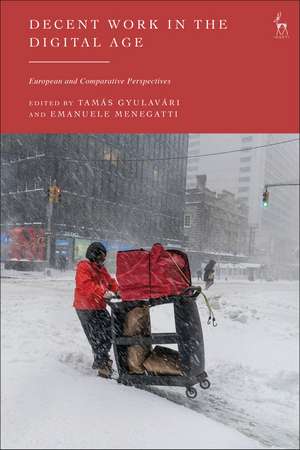Decent Work in the Digital Age: European and Comparative Perspectives
Editat de Tamás Gyulavári, Emanuele Menegattien Limba Engleză Paperback – 17 apr 2024
| Toate formatele și edițiile | Preț | Express |
|---|---|---|
| Paperback (1) | 322.23 lei 6-8 săpt. | |
| Bloomsbury Publishing – 17 apr 2024 | 322.23 lei 6-8 săpt. | |
| Hardback (1) | 572.63 lei 6-8 săpt. | |
| Bloomsbury Publishing – 19 oct 2022 | 572.63 lei 6-8 săpt. |
Preț: 322.23 lei
Preț vechi: 392.35 lei
-18% Nou
Puncte Express: 483
Preț estimativ în valută:
61.66€ • 64.84$ • 50.95£
61.66€ • 64.84$ • 50.95£
Carte tipărită la comandă
Livrare economică 17 aprilie-01 mai
Preluare comenzi: 021 569.72.76
Specificații
ISBN-13: 9781509958276
ISBN-10: 1509958274
Pagini: 416
Dimensiuni: 156 x 234 x 25 mm
Greutate: 0.54 kg
Editura: Bloomsbury Publishing
Colecția Hart Publishing
Locul publicării:London, United Kingdom
ISBN-10: 1509958274
Pagini: 416
Dimensiuni: 156 x 234 x 25 mm
Greutate: 0.54 kg
Editura: Bloomsbury Publishing
Colecția Hart Publishing
Locul publicării:London, United Kingdom
Caracteristici
Provides a theoretical framework on the impact of automatisation, robotics, and digitalisation on the basic principles of individual and collective labour law
Notă biografică
Tamás Gyulavári is Professor of Labour Law and Chair of the Labour Law Department at Pázmány Péter Catholic University in Budapest, Hungary. Emanuele Menegatti is Professor of Labour Law and Dean of the School of Economics and Management at the University of Bologna, Italy.
Cuprins
Foreword Tonia Novitz (University of Bristol, UK) 1. Labour, Law, and Digitalisation Tamás Gyulavári (Pázmány Péter Catholic University, Hungary) and Emanuele Menegatti (University of Bologna, Italy) PART ITHE IMPACT OF AUTOMATISATION AND DIGITALISATION ON WORK RELATIONS 2. Digitalisation and Basic Principles of Labour Law Manfred Weiss (Goethe University, Germany) 3. The Impact of Automatisation and Robotics on Collective Labour Relations: Meeting an Unprecedented Challenge Edoardo Ales (University of Naples 'Parthenope', Italy) 4. EU Law and Digitalisation of Employment Relations Iacopo Senatori (University of Modena and Reggio Emilia, Italy) PART IIPLATFORM WORK AND AGILE WORK ARRANGEMENTS 5. Classification of Platform Workers: A Scholarly Perspective Martin Gruber-Risak (University of Vienna, Austria) 6. The Classification of Platform Workers Through the Lens of Judiciaries: A Comparative Analysis Emanuele Menegatti (University of Bologna, Italy) 7. Floor of Rights for Platform Workers Tamás Gyulavári (Pázmány Péter Catholic University, Hungary) 8. Working Time Flexibility: Merits to Preserve and Potentials to Adjust to Change Gábor Kártyás (Pázmány Péter Catholic University, Hungary) 9.Which Welfare Rights for Platform Workers? Marius Olivier (Nelson Mandela University and Northwest University, South Africa; University of Western Australia) 10. Competition Law Implications of Platform Work Tihamér Tóth (Pázmány Péter Catholic University, Hungary) 11. Decent Teleworking: Lessons from the Pandemic Carla Spinelli (University of Bari Aldo Moro, Italy) PART IIIREGULATING THE ALGORITHM 12. The Challenges of Management by Algorithm: Exploring Individual and Collective Aspects Jeremias Adams-Prassl (University of Oxford, UK) 13. Automation, Autonomy, Augmentation: Labour Regulation and the Technological Transformation of Managerial Prerogatives Antonio Aloisi (IE University, Spain) 14. Discrimination by Algorithms at Work Sylvaine Laulom (Cour De Cassation, France) PART IVDATA PROTECTION AND PRIVACY AT WORK 15. Regulating Worker Privacy and Data Protection: Exploring the Global Source System Frank Hendrickx (University of Leuven, Belgium) 16. From Monitoring of the Workplace to Surveillance of the Workforce David Mangan (Maynooth University, Ireland) 17. Social Media and Freedom of Speech in Employment: Limitations on Employees' Right to Self-Expression András Koltay (Pázmány Péter Catholic University, Hungary)
